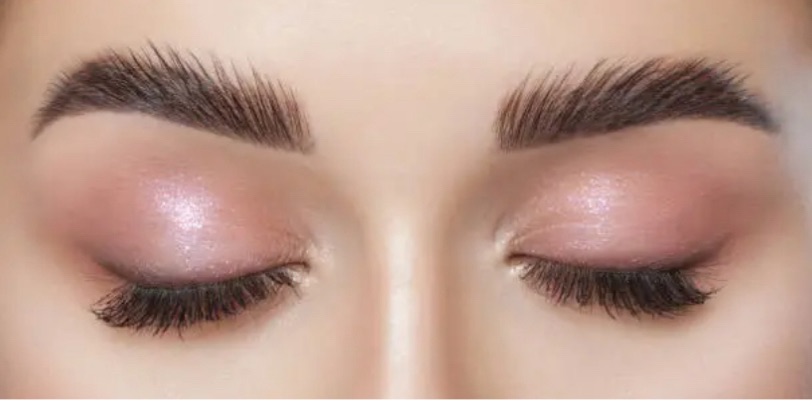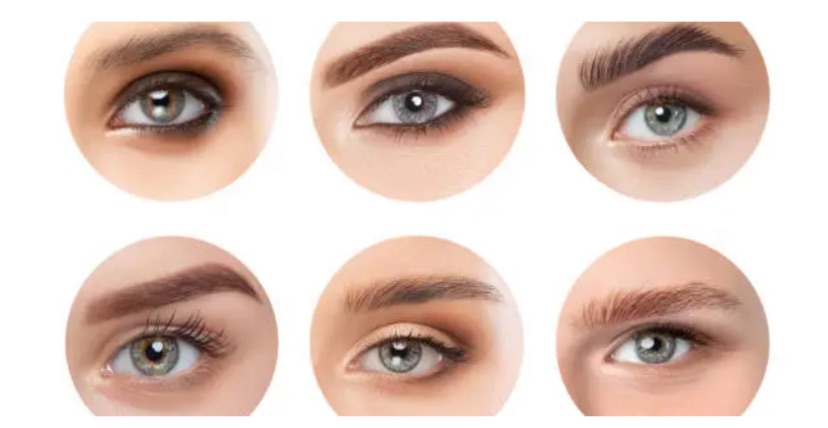Introduction:
The brows function as our eyes’ crowns. They are essential in keeping perspiration from dripping into our eyes; they are not only accessories. They also serve a vital role in facial emotions and shield the bony ridges over the eyes. In Asians, the hair on the eyebrows is often narrower than the hair on the scalp; in Caucasians, the hair on the scalp is thinner.
Even while we love and cherish our eyebrows for who they are and everything they accomplish for us, we may occasionally wonder how to grow thicker eyebrows. Do you also want to know how to get larger eyebrows? If so, continue reading to discover out.

Why Do Thin Eyebrows Occur?
If you have naturally thin eyebrows, have overplucked them, or are losing eyebrow hair, you may be interested in learning how to develop thicker eyebrows. Madarosis is the term used to describe eyebrow loss. Initially, the term “madarosis” was limited to the loss of eyelashes; it was later expanded to cover the loss of eyebrows as well. A number of medical disorders can be indicated by madarosis. The following conditions can result in madarosis, or eyebrow loss.
• Infectious diseases: leprosy, syphilis, herpes infection, human immunodeficiency virus (HIV) infections, infection of hair follicles, etc.
• Diseases of the skin: dermatitis (atopic, seborrheic, contact and neuro types), epidermolysis bullosa, psoriasis, inflammatory disorders of hair and appendages, etc.
• Eye diseases: Blepharitis (Staphylococcal, seborrheic, rosacea and posterior types)
• Nutritional disorders: marasmus, zinc deficiency, iron deficiency, hypoproteinaemia (decreased blood protein) and biotin (vitamin B7) deficiency.
• Mineral toxicity: hypervitaminosis A (increased vitamin A), gold, bismuth, mercury, thallium
• Certain medications: anticholesterol drugs (cholesterol-reducing), antithyroid drugs (decreases thyroid hormone levels), anticoagulants (prevents blood clots), niacin, valproic acid, etc.
• Autoimmune disorders: These are disorders that occur when normal healthy cells of the body are attacked by our immune system. Examples are alopecia areata, Graham-Little syndrome, localised scleroderma, etc.
• Systemic disorders: hyperthyroidism, hyperparathyroidism, hypothyroidism, hypoparathyroidism, etc.
• Trauma or injury: radiation injury, chemical injury, cocaine vapour, etc.
• Inherited disorders: Hallerman- Steriff syndrome, Clouston syndrome, Rothmund-Thomson syndrome, etc.
• Others: after dental treatments, trichodysplasia spinulosa (a rare disease with elevated areas of skin on the face), radiation therapy for cancer, etc
Symptoms of Thin Eyebrows:
As was previously said, thinning eyebrows can indicate a number of underlying medical issues, or they can occur spontaneously. Generally speaking, you may observe a decrease in eyebrow hair thickness or an increase in eyebrow hair loss; this is most obvious in the lateral (out from the central) portion of the eyebrow.1. Furthermore, it could coexist with other physical symptoms such as hair loss on the scalp, rashes, dry skin, etc.; taken together, they could point to specific illnesses. As a result, you should keep track of any additional symptoms and let your doctor know about them to aid in any necessary diagnosis.
Home Remedies for Thick Eyebrows:
If you’re wondering how to grow thick eyebrows, you can try these home remedies. These are some natural techniques that could aid in the growth of fuller, thicker eyebrows. Check which one best fits you by giving them a try.
1. Coconut Oil
Coconut oil might support healthy hair growth. It is beneficial for hair regrowth as well. It could be among the most beneficial natural nutrients for hair. It can be applied as a DIY treatment for thick eyebrows.2. You can apply a small amount of coconut oil on your eyebrows and rub it in a circular motion. This being done at night, storing the oil till the next day, and then washing it the next morning may be good for growing thicker eyebrows.
2. Olive Oil
Studies on animals have shown that applying olive oil can stimulate hair growth. Therefore, it shows that olive oil is a potential hair growth agent.3 Moreover, it is valuable for thick and bushy eyebrows. You can take a cotton swab and dip it in olive oil. Using this swab, massage your eyebrow region thoroughly. Leaving it overnight may also be beneficial. You might be able to see a visible difference in your eyebrows if you follow this routine diligently.
3. Oil of peppermint
According to research on animals, peppermint oil increases blood flow to hair follicles, which in turn stimulates hair growth. It may be applied as a medicinal agent in addition to preventing hair loss.
Although more human research is required to confirm its effectiveness, it is being utilized as a home treatment for hair growth. Applying a few drops of peppermint oil to a cotton swab and gently rubbing it in a circular motion over your eyebrows can help you achieve thicker eyebrows. There might be obvious advantages to leaving it overnight and washing it the next day.
4. Aloe Vera
It was seen in a study that aloe vera helps hair growth and has hair and follicle strengthening effects.5 It is used for multiple purposes due to its therapeutic effects. It is valuable for getting thicker eyebrows. You can take a fresh aloe vera leaf and cut it open to obtain the gel. Then, mix this gel with a small amount of coconut oil and apply it to your eyebrows until it gets absorbed. You can leave it for some time and then wash it off. Doing it regularly might help you grow fuller eyebrows.
5. Rosemary Oil
Rosemary essential oil is valuable for promoting hair growth. When applied externally, rosemary might stimulate the hair follicles, thus helping hair growth.It is good for obtaining dense eyebrows. You can use this as one of the home remedies for thick eyebrows by mixing rosemary oil in coconut oil and applying it on your eyebrows at night, then washing it off the next day.
6. Oil of Lavender
Lavender oil has been shown in animal experiments to stimulate hair growth.7. Further research on humans is required to confirm the effects of lavender oil on people. Lavender oil is useful, nevertheless, as a DIY treatment for thick eyebrows. By applying a few drops of lavender oil to your eyebrows and gently massaging them, you can use lavender oil to help grow darker and thicker eyebrows. You can leave the oil on overnight. Clean it in the morning. Regular use of this medication may promote the growth of eyebrow hair.
7. Onion
Onions encourage the growth of hair. It is rich in minerals, primarily iron, which feeds the follicles with oxygen, promoting hair growth.Six You can apply a mixture of onion juice and honey to the area around your eyebrows to achieve thicker eyebrows. This technique might be useful for developing bushy, thick, and dense eyebrows.
8. Underripe Banana
An investigation on animals revealed that unripe bananas had properties that encourage the growth of hair.8It’s beneficial for thickening and fuller eyebrows, but more human research are necessary. Peeling and mashing an unripe banana is an option. Blend this with honey and dab it under your brows. After letting it sit for a time, rinse it off with cold water. If you apply this cure on a daily basis, you might find that it helps you grow larger eyebrows.
There are studies that support the benefits of the herbs listed and the home cures for thicker eyebrows, but they are not conclusive. Large-scale human research are required to determine the actual extent to which these home cures improve human health.As a result, these ought to be used sparingly and never in place of medical advice.
In conclusion, after seeing numerous people, you may desire bushier and thicker eyebrows. But what if your eyebrows don’t develop the way you want them to? Do you have any ideas on how to get larger eyebrows? The hair on your eyebrows may appear thinner, thinner, or have fallen out.
There are a few possible causes for this, including alopecia areata, hormone imbalances, and naturally thin eyebrows. However, you can try a few natural treatments for thick eyebrows, such onion, coconut oil, lavender oil, etc. But, if you see scales on your skin, notice losing hair on your head, or experience eye issues, you should contact a dermatologist (a doctor who treats hair and skin disorders). Thin or absent eyebrows may indicate a medical illness.
